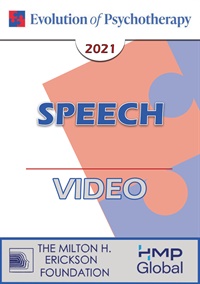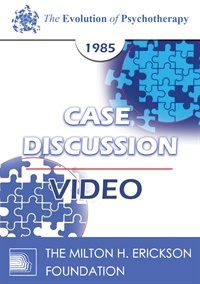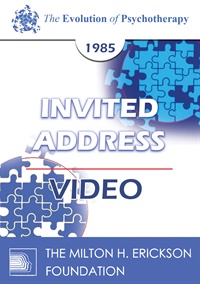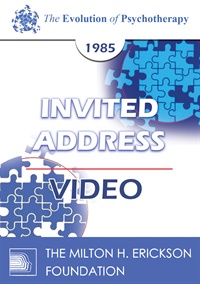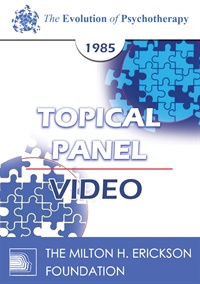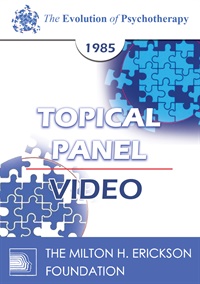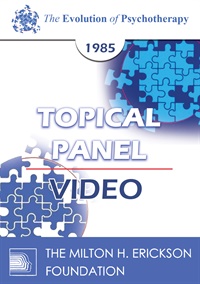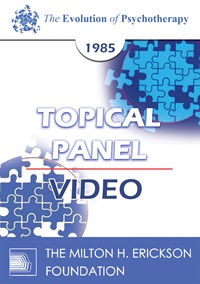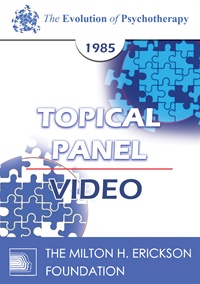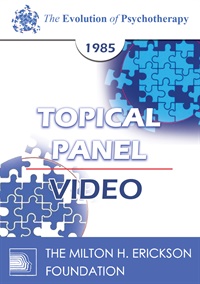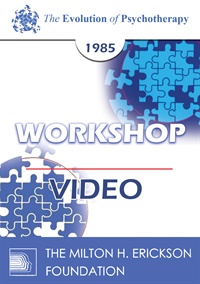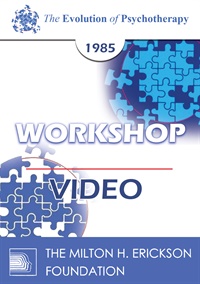- Average Rating:
- Not yet rated
- Topic Areas:
- Feedback Informed Treatment (FIT) | Psychotherapy | Speeches | Therapist Development
- Categories:
- Evolution of Psychotherapy | Evolution of Psychotherapy 2021
- Faculty:
- Scott Miller, PhD
- Course Levels:
- Master Degree or Higher in Health-Related Field
- Duration:
- 1 hour
- Format:
- Audio and Video
- Original Program Date:
- Dec 04, 2021
- Short Description:
- What can mental health professionals do to enhance their performance? Available evidence makes clear that attending a typical continuing education workshop, specializing in the treatment of a particular problem, or learning a new treatment model does little to improve effectiveness. In fact, studies to date indicate clinical effectiveness actually declines with time and experience in the field. The key to improved performance is engaging in deliberate practice. At this workshop, the latest research on deliberate practice will be translated into concrete steps all clinicians can immediately apply in their efforts to achieve better results.
- Price:
- $59.00 - Base Price
- Average Rating:
- Not yet rated
- Topic Areas:
- Case Discussions | Psychotherapy | Family Therapy | Therapist Development | Object Relations Theory | Strategic Therapy
- Categories:
- Evolution of Psychotherapy | Evolution of Psychotherapy 1985 | Pioneers in Couples and Family Therapy
- Faculty:
- James F. Masterson, MD | Salvador Minuchin, MD | Paul Watzlawick, PhD | Carl Whitaker, MD
- Course Levels:
- Master Degree or Higher in Health-Related Field
- Duration:
- 1:01:34
- Format:
- Audio and Video
- Original Program Date:
- Dec 12, 1985
- Short Description:
- A panel of seasoned clinicians explores the case of JJ, a 37-year-old woman navigating intense mood swings, unstable relationships, and a painful personal history. With differing approaches, the speakers reflect on attachment, trauma, and the therapist’s emotional response. Across perspectives, they call for curiosity, compassion, and long-term thinking when working with clients who both resist and long for connection. Moderated by Ann Wright-Edwards, MS.
- Price:
-
Sale is $29.00
price reduced from Base Price - $59.00
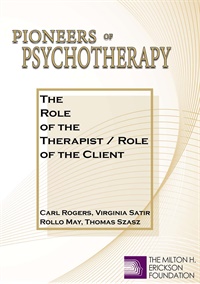
- Average Rating:
- Not yet rated
- Topic Areas:
- Psychotherapy | Clinical Demonstrations | Therapist Development | Therapeutic Relationship
- Bundle(s):
- Pioneers of Psychotherapy Bundle
- Categories:
- Pioneers of Psychotherapy | Evolution of Psychotherapy | Evolution of Psychotherapy 1985 | Pioneers in Couples and Family Therapy
- Faculty:
- Carl Rogers, PhD | Virginia Satir, MA, ACSW | Rollo May, PhD | Thomas Szasz, MD
- Course Levels:
- Master Degree or Higher in Health-Related Field
- Duration:
- 1 Hour 2 Minutes
- Format:
- Audio and Video
- Original Program Date:
- Dec 12, 1985
- Short Description:
- This classic panel brings together May, Rogers, Satir and Szasz for a spirited look at what really happens in the therapeutic relationship. They explore the therapist’s function, the client’s needs, and the human qualities that make therapy safe, honest and growth-promoting. The conversation blends empathy, ethics and practicality, offering a rare window into how master clinicians think about presence, responsibility and genuine connection in the therapy room.
- Price:
- $59.00 - Base Price
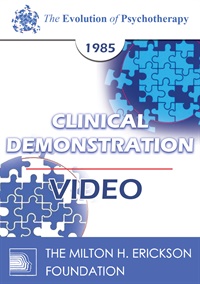
- Average Rating:
- Not yet rated
- Topic Areas:
- Clinical Presentations | Family Therapy | Psychotherapy | Systems Theory | Therapist Development
- Categories:
- Evolution of Psychotherapy | Evolution of Psychotherapy 1985 | Pioneers in Couples and Family Therapy
- Faculty:
- Salvador Minuchin, MD
- Course Levels:
- Master Degree or Higher in Health-Related Field
- Duration:
- 54:55
- Format:
- Audio and Video
- Original Program Date:
- Dec 11, 1985
- Short Description:
- This session examines a family's long-term struggle with codependency and the emotional toll it takes on adult children. When one daughter attempts suicide and another feels trapped in a caregiving role, the therapist helps shift entrenched patterns. Through strategic disengagement, the family begins to reorganize, fostering greater independence and emotional well-being for all involved.
- Price:
-
Sale is $29.00
price reduced from Base Price - $59.00
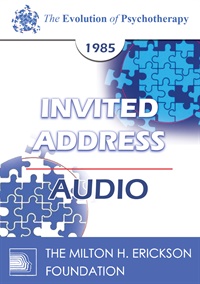
- Average Rating:
- Not yet rated
- Topic Areas:
- Invited Addresses | Psychotherapy | Research | Therapist Development
- Categories:
- Evolution of Psychotherapy | Evolution of Psychotherapy 1985
- Duration:
- 39 Minutes
- Format:
- Audio Only
- Original Program Date:
- Dec 11, 1985
- Short Description:
- Educational Objectives: To describe outcome and followup data regarding psychotherapy that are rapid and durable To describe a systemic framework that can demystify certain confusing (and confused) issues pertaining to theory and practice
- Price:
- $15.00 - Base Price
- Average Rating:
- Not yet rated
- Topic Areas:
- Invited Addresses | Family Therapy | Psychotherapy | Supervision | Therapist Development | History of Psychotherapy
- Categories:
- Evolution of Psychotherapy | Evolution of Psychotherapy 1985 | Pioneers in Couples and Family Therapy
- Faculty:
- Salvador Minuchin, MD | Zerka Moreno
- Course Levels:
- Master Degree or Higher in Health-Related Field
- Duration:
- 1:20:57
- Format:
- Audio and Video
- Original Program Date:
- Dec 12, 1985
- Short Description:
- This conversation brings together two influential voices reflecting on the development of family therapy. Salvador Minuchin traces its shift from holistic, family-focused care to an individual diagnostic model, and back again. He underscores the importance of adapting therapeutic strategies to the family’s structure and context. Zerka Moreno shares the power of action-oriented methods like psychodrama, highlighting how family members often relate more to imagined roles than to one another. Moderated by Sharon Cottor, MSW.
- Price:
-
Sale is $29.00
price reduced from Base Price - $59.00
- Average Rating:
- Not yet rated
- Topic Areas:
- Invited Addresses | Psychotherapy | Communication | Therapist Development | Reframing | Strategic Therapy
- Categories:
- Evolution of Psychotherapy | Evolution of Psychotherapy 1985 | Pioneers in Couples and Family Therapy
- Faculty:
- Paul Watzlawick, PhD | Ernest Rossi, PhD
- Course Levels:
- Master Degree or Higher in Health-Related Field
- Duration:
- 1:20:53
- Format:
- Audio and Video
- Original Program Date:
- Dec 12, 1985
- Short Description:
- Watzlawick explores the evolution of therapeutic language from insight to action, critiquing linear models in favor of systemic, behavior-focused approaches. Drawing on figures like Franz Alexander, Jean Piaget, and Milton Erickson, he illustrates how change often begins by acting "as if" transformation is possible. Through performative techniques and behavioral prescriptions, therapists can help shift perceived reality and foster meaningful adaptation.
- Price:
-
Sale is $29.00
price reduced from Base Price - $59.00
- Average Rating:
- Not yet rated
- Topic Areas:
- Invited Addresses | Family Therapy | Psychotherapy | Experiential Therapy | Therapist Development
- Categories:
- Evolution of Psychotherapy | Evolution of Psychotherapy 1985 | Pioneers in Couples and Family Therapy
- Faculty:
- Carl Whitaker, MD | Albert Ellis, PhD
- Course Levels:
- Master Degree or Higher in Health-Related Field
- Duration:
- 1:28:51
- Format:
- Audio and Video
- Original Program Date:
- Dec 13, 1985
- Short Description:
- Carl Whitaker explores family therapy through a systemic lens, emphasizing therapists' role in understanding family dynamics, unconscious processes, and strategic communication. Challenging traditional therapeutic approaches, he advocates for collaborative, boundary-aware interventions that support family transformation and emotional growth. With discussants Albert Ellis and Virginia Satir Moderated by Camillo Loriedo
- Price:
-
Sale is $29.00
price reduced from Base Price - $59.00
- Average Rating:
- Not yet rated
- Topic Areas:
- Invited Addresses | Psychotherapy | Therapist Development
- Categories:
- Evolution of Psychotherapy | Evolution of Psychotherapy 1985
- Faculty:
- Bruno Bettelheim | Ronald Laing, MD
- Course Levels:
- Master Degree or Higher in Health-Related Field
- Duration:
- 1:28:20
- Format:
- Audio and Video
- Original Program Date:
- Dec 13, 1985
- Short Description:
- Educational Objectives: To know the Indications and essentials for residential treatment To know the staffing pattern required for residential treatment To know the likely outcomes of residential treatment
- Price:
-
Sale is $29.00
price reduced from Base Price - $59.00
- Average Rating:
- Not yet rated
- Topic Areas:
- Invited Addresses | Psychotherapy | Therapeutic Relationship | Therapist Development
- Categories:
- Evolution of Psychotherapy | Evolution of Psychotherapy 1985
- Faculty:
- Judd Marmor | Aaron Beck, MD
- Course Levels:
- Master Degree or Higher in Health-Related Field
- Duration:
- 1:39:02
- Format:
- Audio and Video
- Original Program Date:
- Dec 14, 1985
- Short Description:
- Invited Address Session 10 - Part 1 - The Nature of the Psychotherapeutic Process featuring Judd Marmor, MD. With discussant Aaron T Beck, MD. Moderated by Stuart M Gould, Jr, MD.
- Price:
-
Sale is $29.00
price reduced from Base Price - $59.00
- Average Rating:
- Not yet rated
- Topic Areas:
- Topical Panels | Psychotherapy | Therapist Development | Training
- Categories:
- Evolution of Psychotherapy | Evolution of Psychotherapy 1985
- Faculty:
- Robert L. Goulding, MD | Arnold Lazarus, Ph.D. | Erving Polster, PhD | Lewis R Wolberg, M.D.
- Course Levels:
- Master Degree or Higher in Health-Related Field
- Duration:
- 1:00:02
- Format:
- Audio and Video
- Original Program Date:
- Dec 12, 1985
- Short Description:
- Topical Panel 06 on Training Psychotherapists Part 1, featuring Robert L Goulding, MD, Arnold A Lazarus, PhD, Erving Polster, PhD, and Lewis R Wolberg, MD. Moderated by Sharon Cottor, MSW.
- Price:
-
Sale is $29.00
price reduced from Base Price - $59.00
- Average Rating:
- Not yet rated
- Topic Areas:
- Topical Panels | Psychotherapy | Therapist Development | Training
- Categories:
- Evolution of Psychotherapy | Evolution of Psychotherapy 1985 | Pioneers in Couples and Family Therapy
- Faculty:
- James Bugental, PhD | Mary Goulding, MSW | Jay Haley, MA | Miriam Polster
- Course Levels:
- Master Degree or Higher in Health-Related Field
- Duration:
- 58:07
- Format:
- Audio and Video
- Original Program Date:
- Dec 13, 1985
- Short Description:
- The panel outlines key qualities and training methods for psychotherapists, emphasizing traits like empathy, creativity, and persistence. Training approaches include didactic learning, hands-on practice, video review, and live supervision. The discussion addresses the value of personal therapy, the challenges of academic settings, and the importance of adaptability in preparing therapists from diverse backgrounds.
- Price:
-
Sale is $29.00
price reduced from Base Price - $59.00
- Average Rating:
- Not yet rated
- Topic Areas:
- Topical Panels | Family Therapy | Group Therapy | Psychotherapy | Therapist Development
- Categories:
- Evolution of Psychotherapy | Evolution of Psychotherapy 1985 | Pioneers in Couples and Family Therapy
- Faculty:
- Albert Ellis, PhD | Robert L. Goulding, MD | Salvador Minuchin, MD | Zerka Moreno
- Course Levels:
- Master Degree or Higher in Health-Related Field
- Duration:
- 58:19
- Format:
- Audio and Video
- Original Program Date:
- Dec 13, 1985
- Short Description:
- This conversation traces the changing landscape of psychotherapy through the lens of four influential voices. Albert Ellis shares how Rational Emotive Therapy adapts across settings, while Robert Goulding highlights the power of group work for clients who struggle with connection. Zerka Moreno speaks to the depth gained through role reversal, especially in grief work. Salvador Minuchin calls for a renewed focus on family systems and the social forces shaping clinical practice. Moderated by John C Racy, MD.
- Price:
-
Sale is $29.00
price reduced from Base Price - $59.00
- Average Rating:
- Not yet rated
- Topic Areas:
- Topical Panels | Relationships | Therapeutic Relationship | Therapist Development | Psychotherapy
- Categories:
- Evolution of Psychotherapy | Evolution of Psychotherapy 1985 | Pioneers in Couples and Family Therapy
- Faculty:
- Rollo May, PhD | Carl Rogers, PhD | Virginia Satir, MA, ACSW | Thomas Szasz, MD
- Course Levels:
- Master Degree or Higher in Health-Related Field
- Duration:
- 1:01:12
- Format:
- Audio and Video
- Original Program Date:
- Dec 13, 1985
- Short Description:
- An examination of the therapeutic relationship, with experts highlighting adaptability, empathy, and client-centered approaches. Panelists discuss the nuanced dynamics between therapists and clients, addressing ethical considerations, personal growth, and the complex nature of psychological healing. Moderated by F Theodore Reid, Jr, MD.
- Price:
- $59.00 - Base Price
- Average Rating:
- Not yet rated
- Topic Areas:
- Topical Panels | Psychotherapy | History of Psychotherapy | Experiential Therapy | Therapist Development
- Categories:
- Evolution of Psychotherapy | Evolution of Psychotherapy 1985 | Pioneers in Couples and Family Therapy
- Faculty:
- Rollo May, PhD | Carl Rogers, PhD | Thomas Szasz, MD | Carl Whitaker, MD
- Course Levels:
- Master Degree or Higher in Health-Related Field
- Duration:
- 55:44
- Format:
- Audio and Video
- Original Program Date:
- Dec 14, 1985
- Short Description:
- Panelists Rollo May, Carl Rogers, Thomas Szasz, and Carl Whitaker explore psychotherapy's evolution. May traces its roots from ancient Greece to modern times, Rogers emphasizes client-centered therapy, Szasz critiques psychotherapy's myths, and Whitaker stresses practical approaches. The panel reflects on independent thinking and the risks of misusing therapeutic techniques. Moderated by Ann Wright-Edwards, MS.
- Price:
-
Sale is $29.00
price reduced from Base Price - $59.00
- Average Rating:
- Not yet rated
- Topic Areas:
- Topical Panels | Humor | Psychotherapy | Therapist Development
- Categories:
- Evolution of Psychotherapy | Evolution of Psychotherapy 1985 | Pioneers in Couples and Family Therapy
- Faculty:
- Murray Bowen, MD | Albert Ellis, PhD | Robert L. Goulding, MD | Ronald Laing, MD
- Course Levels:
- Master Degree or Higher in Health-Related Field
- Duration:
- 57:10
- Format:
- Audio and Video
- Original Program Date:
- Dec 14, 1985
- Short Description:
- These pioneering therapists explore humor's healing potential in psychotherapy, sharing innovative techniques for using laughter as a transformative therapeutic tool. Moderated by John C Racy, MD.
- Price:
-
Sale is $29.00
price reduced from Base Price - $59.00
- Average Rating:
- Not yet rated
- Topic Areas:
- Supervision Panels | Psychotherapy | Family Therapy | Therapist Development | Group Therapy
- Categories:
- Evolution of Psychotherapy | Evolution of Psychotherapy 1985 | Pioneers in Couples and Family Therapy
- Faculty:
- Bruno Bettelheim | Albert Ellis, PhD | Salvador Minuchin, MD | Miriam Polster
- Course Levels:
- Master Degree or Higher in Health-Related Field
- Duration:
- 59:14
- Format:
- Audio and Video
- Original Program Date:
- Dec 13, 1985
- Short Description:
- This session explores how to support inpatient staff—especially nurses—in delivering meaningful group therapy. The panel emphasizes the value of teaching practical methods like Rational Emotive Therapy while also recognizing the need to tailor interventions to individuals before addressing larger family systems. Discussion includes how to avoid overly hierarchical roles in treatment, and how to sustain therapeutic momentum despite systemic barriers like resident turnover. Moderated by Stuart M Gould, Jr, MD.
- Price:
-
Sale is $29.00
price reduced from Base Price - $59.00
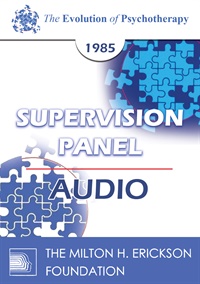
- Average Rating:
- Not yet rated
- Topic Areas:
- Supervision Panels | Gestalt | Strategic Therapy | Therapist Development | Cognitive Behavior Therapy (CBT)
- Categories:
- Evolution of Psychotherapy | Evolution of Psychotherapy 1985 | Pioneers in Couples and Family Therapy
- Faculty:
- Aaron Beck, MD | Arnold Lazarus, Ph.D. | Cloe Madanes, HDL, LIC | Zerka Moreno
- Duration:
- 57 Minutes
- Format:
- Audio Only
- Original Program Date:
- Dec 13, 1985
- Short Description:
- A supervision panel featuring top experts reviews challenging clinical cases with audience input. Topics include health anxiety, family conflict, abuse recovery, and self-harm. Interventions range from flooding techniques and conjoint family therapy to involving spouses and addressing unfinished emotional issues. The panel emphasizes tailored, collaborative strategies for complex cases. Moderated by Larry E Beutler, PhD.
- Price:
- $15.00 - Base Price
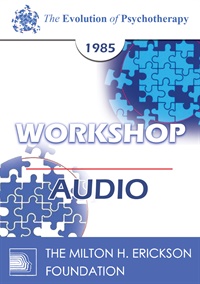
- Average Rating:
- Not yet rated
- Topic Areas:
- Workshops | Psychotherapy | Meditation, Spirituality and Yoga | Therapist Development
- Categories:
- Evolution of Psychotherapy | Evolution of Psychotherapy 1985
- Faculty:
- Ronald Laing, MD
- Duration:
- 2 Hours 7 Minutes
- Format:
- Audio Only
- Original Program Date:
- Dec 11, 1985
- Short Description:
- This is a theoretical and practical exposition of how to increase the efficacy of therapeutic techniques. Demonstration and experiential exercises.
- Price:
- $15.00 - Base Price
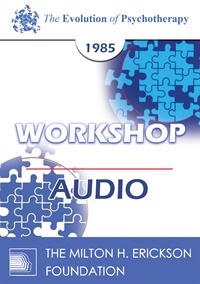
- Average Rating:
- Not yet rated
- Topic Areas:
- Workshops | Psychotherapy | Therapist Development
- Categories:
- Evolution of Psychotherapy | Evolution of Psychotherapy 1985 | Pioneers in Couples and Family Therapy
- Faculty:
- Virginia Satir, MA, ACSW | Mary Goulding, MSW
- Duration:
- 2 Hours 16 Minutes
- Format:
- Audio Only
- Original Program Date:
- Dec 11, 1985
- Short Description:
- This workshop highlights the therapist’s personal presence and genuine connection as critical to effective therapy. Emphasis is placed on activating clients' strengths and setting clear, loving boundaries within families. Using a blended family case involving past abuse and behavioral struggles, Satir models practical approaches for safety, communication, and managing complex family dynamics. The session also addresses cultural and personal considerations around physical touch, demonstrating sensitive, respectful handling of therapeutic interactions through role-playing examples.
- Price:
- $15.00 - Base Price
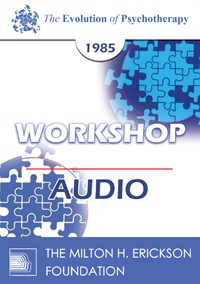
- Average Rating:
- Not yet rated
- Topic Areas:
- Workshops | Psychotherapy | Therapist Development
- Categories:
- Evolution of Psychotherapy | Evolution of Psychotherapy 1985
- Faculty:
- Joseph Wolpe, M.D.
- Duration:
- 2 Hours 27 Minutes
- Format:
- Audio Only
- Original Program Date:
- Dec 11, 1985
- Short Description:
- An exposition of the methods of obtaining from neurotic patients the information necessary for selection of techniques, description of the most common techniques, demonstration of relaxation training and assertive training.
- Price:
- $15.00 - Base Price
- Average Rating:
- Not yet rated
- Topic Areas:
- Workshops | Psychotherapy | Therapeutic Relationship | Therapist Development
- Categories:
- Evolution of Psychotherapy | Evolution of Psychotherapy 1985
- Faculty:
- Carl Rogers, PhD | Ruth Sanford, MA
- Course Levels:
- Master Degree or Higher in Health-Related Field
- Duration:
- 2:55:50
- Format:
- Audio and Video
- Original Program Date:
- Dec 11, 1985
- Short Description:
- A brief discussion of my experience with demonstration interviews. A "client" will be selected from among those who volunteer. A thirty-minute demonstration interview will be held, followed by interaction between the group, the client and me.
- Price:
- $59.00 - Base Price
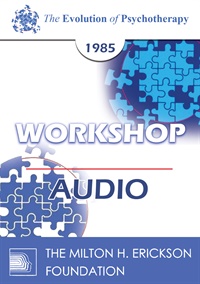
- Average Rating:
- Not yet rated
- Topic Areas:
- Workshops | Psychotherapy | Therapist Development
- Categories:
- Evolution of Psychotherapy | Evolution of Psychotherapy 1985
- Faculty:
- Joseph Wolpe, M.D.
- Duration:
- 2 Hours 48 Minutes
- Format:
- Audio Only
- Original Program Date:
- Dec 12, 1985
- Short Description:
- This will be an opportunity to make behavior analyses of well-studied cases of attendees with directions, if feasible, for behavioral treatment.
- Price:
- $15.00 - Base Price
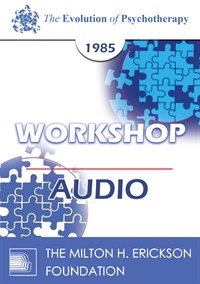
- Average Rating:
- Not yet rated
- Topic Areas:
- Workshops | Gestalt | Therapist Development | Psychotherapy
- Categories:
- Evolution of Psychotherapy | Evolution of Psychotherapy 1985
- Faculty:
- Miriam Polster
- Duration:
- 1 Hour 32 Minutes
- Format:
- Audio Only
- Original Program Date:
- Dec 13, 1985
- Short Description:
- Change in psychotherapy is a gradual process with predictable stages which can be understood and prepared for. Integrating new perspectives and behaviors requires attention to the needs of each of three phases: support, accommodation, and assimilation. These stages will be defined and demonstrated in work with volunteer workshop participants.
- Price:
- $15.00 - Base Price
- Average Rating:
- Not yet rated
- Topic Areas:
- Workshops | Family Therapy | Psychotherapy | Cultural and Social Contexts | Therapist Development
- Categories:
- Evolution of Psychotherapy | Evolution of Psychotherapy 1985 | Pioneers in Couples and Family Therapy
- Faculty:
- Salvador Minuchin, MD
- Course Levels:
- Master Degree or Higher in Health-Related Field
- Duration:
- 1:58:09
- Format:
- Audio and Video
- Original Program Date:
- Dec 13, 1985
- Short Description:
- Minuchin explores how change occurs in family therapy by focusing on universal patterns—like enmeshment, overprotection, and dependency—that cut across family systems. In sessions with high-conflict or symptomatic families, he challenges entrenched roles using metaphor, humor, and confrontation to shift responsibility and promote healthier dynamics. Minuchin underscores the therapist's role as both participant and guide, adapting interventions to the family’s structure and style.
- Price:
-
Sale is $29.00
price reduced from Base Price - $59.00


